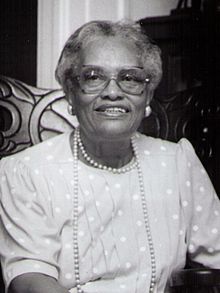Dovey Johnson Roundtree
| Dovey Johnson Roundtree | |
|---|---|

Dovey Johnson Roundtree, Charlotte, NC 1994
|
|
| Born |
Dovey Mae Johnson April 17, 1914 Charlotte, North Carolina, U.S. |
| Alma mater |
Spelman College Howard University School of Law |
| Occupation | Civil rights and criminal defense lawyer, minister, Army veteran |
| Years active | 1951–1996 |
| Known for | Counsel for the petitioner in Sarah Keys v. Carolina Coach Company (64 MCC 769 (1955) First black member of DC Women's Bar American Bar Association 2000 Margaret Brent Award winner |
Dovey Johnson Roundtree (born April 17, 1914) is an African-American civil rights activist, ordained minister, and attorney. Her 1955 victory before the Interstate Commerce Commission in the first bus desegregation case to be brought before the ICC resulted in the only explicit repudiation of the "separate but equal" doctrine in the field of interstate bus transportation by a court or federal administrative body. That case, Sarah Keys v. Carolina Coach Company (64 MCC 769 (1955)), which Dovey Roundtree argued with her law partner and mentor Julius Winfield Robertson, was invoked by Attorney General Robert F. Kennedy during the 1961 Freedom Riders' campaign in his successful battle to compel the Interstate Commerce Commission to enforce its rulings and end Jim Crow in public transportation.
Roundtree was saluted by First Lady Michelle Obama on the occasion of the release of her 2009 autobiography, Justice Older than the Law, which Roundtree co-authored with Washington journalist Katie McCabe and which won the 2009 Letitia Woods Brown Award from the Association of Black Women Historians. In a letter made public at a July 23, 2009 tribute to Roundtree at the Women in Military Service for America Memorial at Arlington National Cemetery, the First Lady cited Roundtree's historic contributions to the law, the military and the ministry, and stated: "It is on the shoulders of people like Dovey Johnson Roundtree that we stand today, and it is with her commitment to our core ideals that we will continue moving toward a better tomorrow."
A protégé of black activist and educator Mary McLeod Bethune, Roundtree was selected by Bethune for the first class of African-American women to be trained as officers in the newly created Women's Army Auxiliary Corps (later the Women's Army Corps) during World War II. In 1961 she became one of the first women to receive full ministerial status in the African Methodist Episcopal Church, which had just begun ordaining women at a level beyond mere preachers in 1960. With her controversial admission to the all-white Women's Bar of the District of Columbia in 1962, she broke the color bar for minority women in the Washington legal community. In one of Washington's most sensational and widely covered murder cases, United States v. Ray Crump, tried in the summer of 1965 on the eve of the Watts riots, Roundtree won acquittal for the black laborer accused of the murder of Georgetown socialite (and former wife of a CIA officer) Mary Pinchot Meyer, a woman with romantic ties to President John F. Kennedy.
...
Wikipedia
